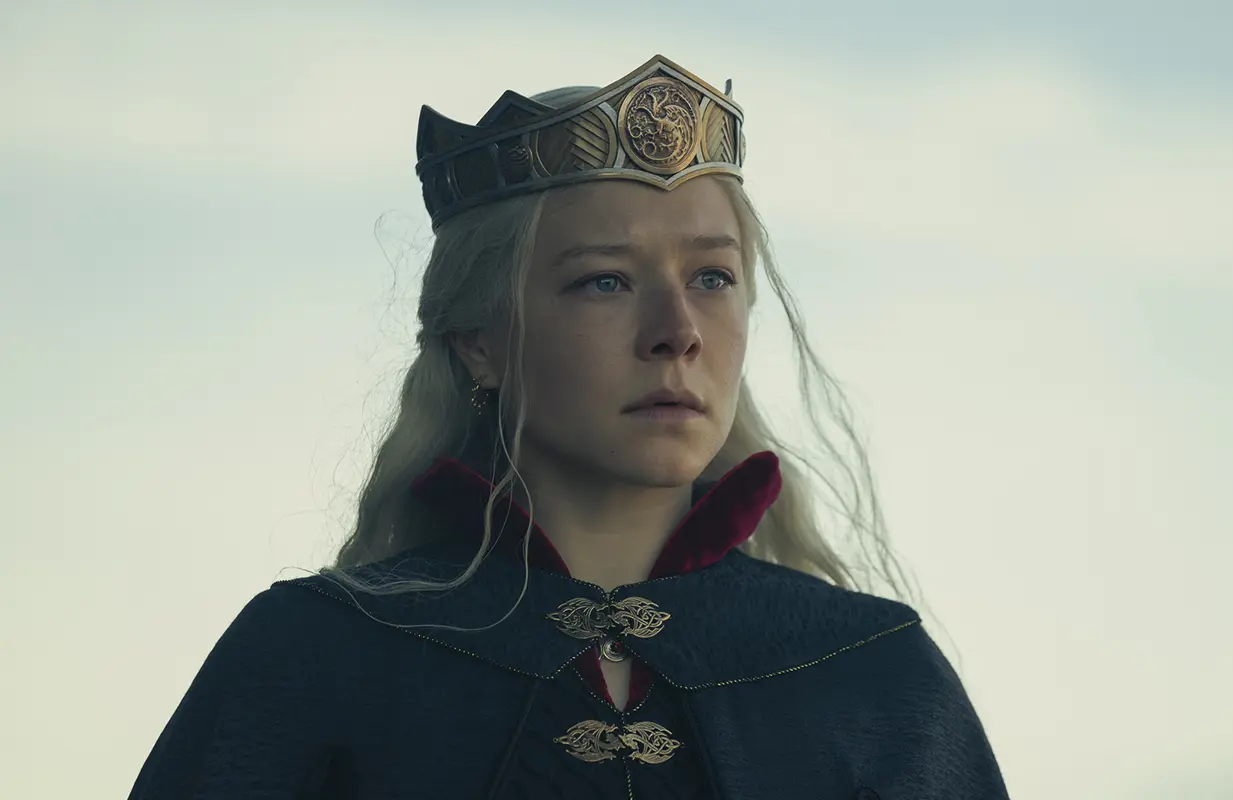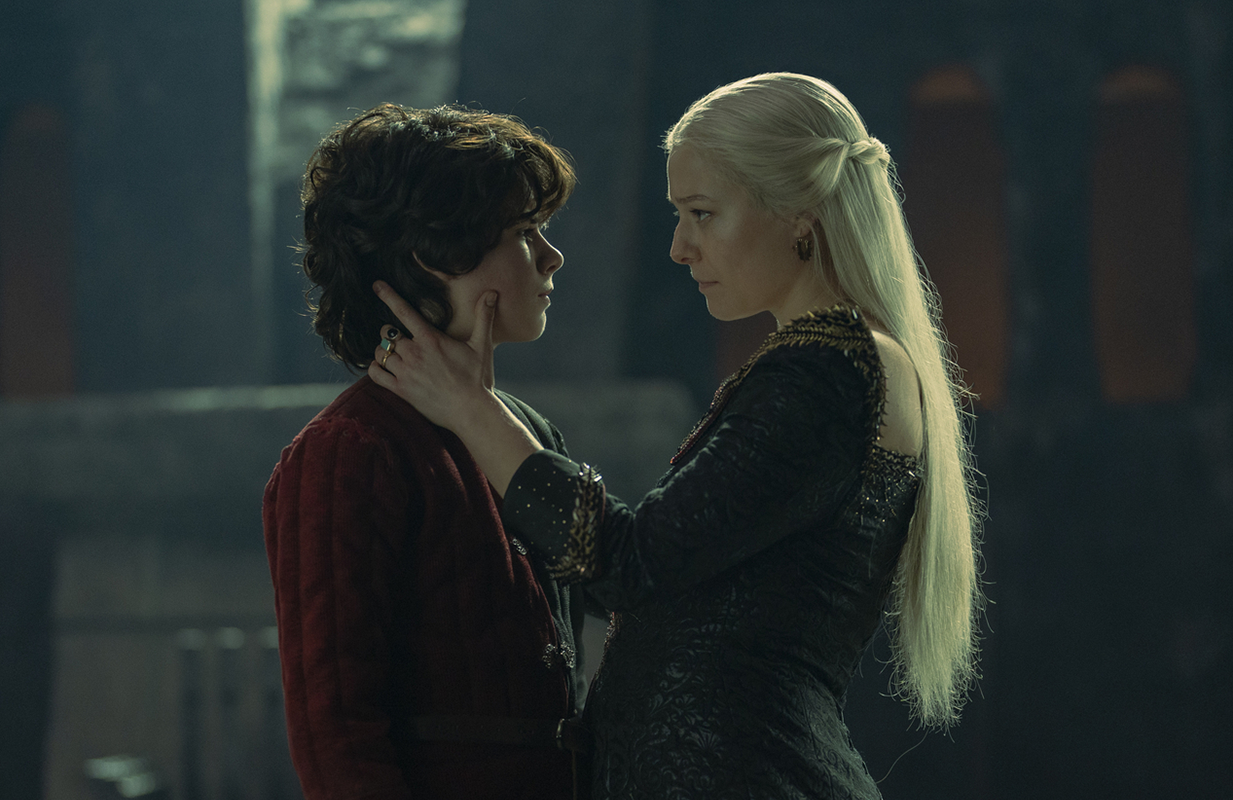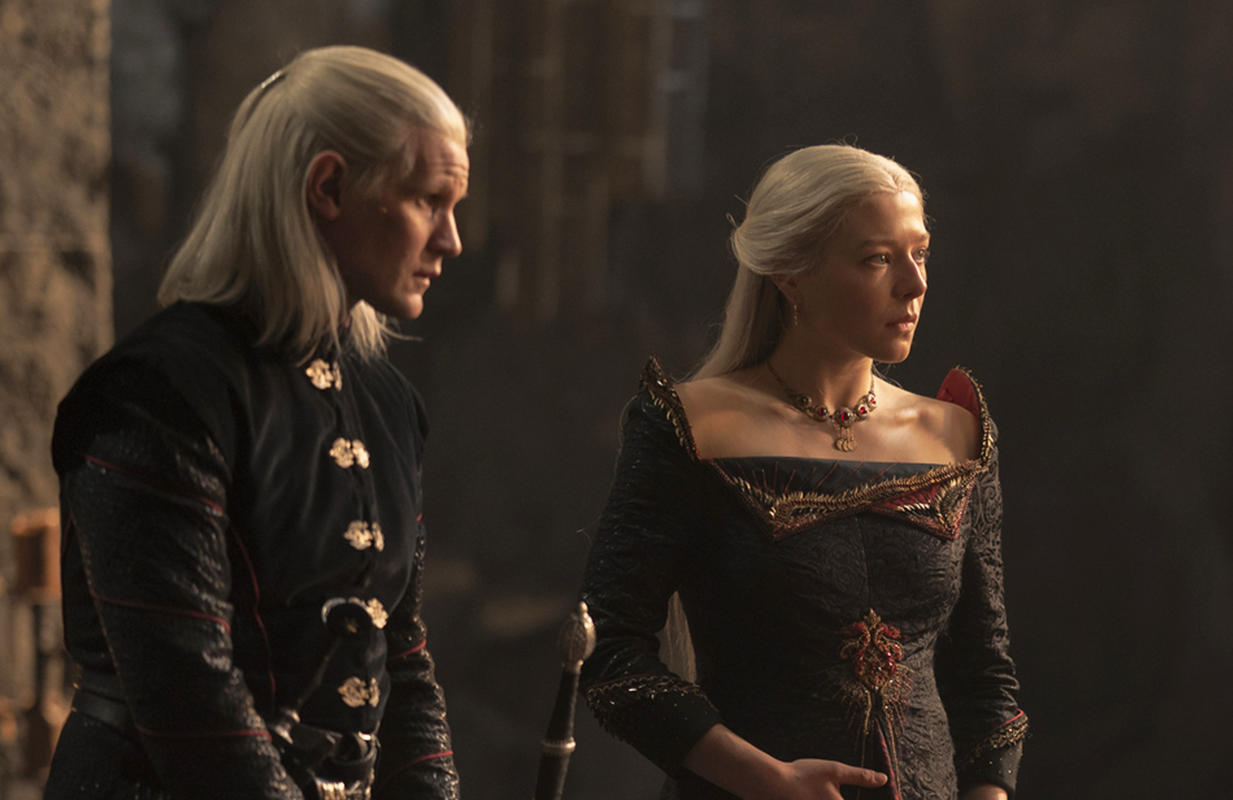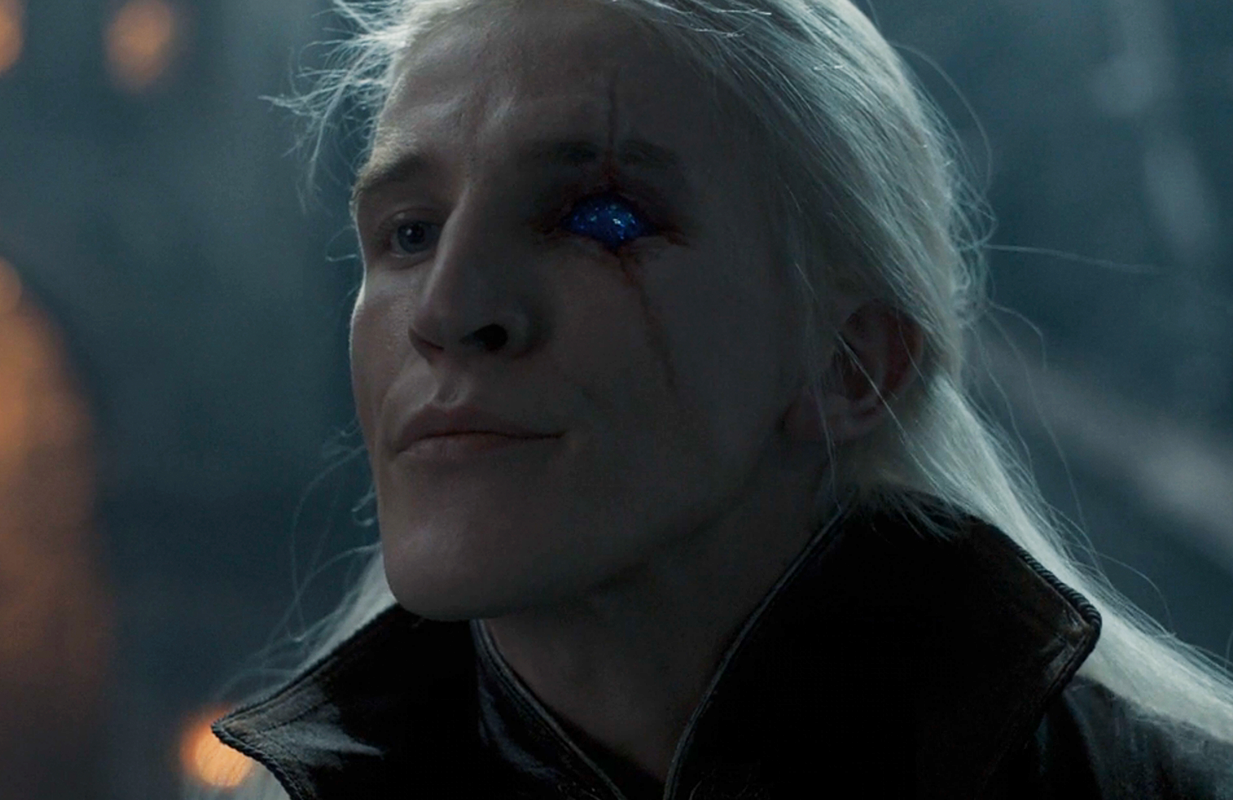A Game of Thrones Alum and Newbie Break Down House of the Dragon Season 1
-
 Emma D'Arcy in House of the Dragon (Photo: Ollie Upton/HBO)
Emma D'Arcy in House of the Dragon (Photo: Ollie Upton/HBO)Our watch is ended, for now — House of the Dragon wrapped its first season on October 23 with a finale that's already been watched by 9.3 million viewers. The Game of Thrones prequel based on George R.R. Martin's Fire and Blood kept up an impressive pace throughout its inaugural season, averaging 29 million viewers per episode (yes, even though a lot of them couldn't see what was happening at times).
It would seem that, despite any lingering bad memories of the original series's final season, the world of Thrones is back with a vengeance. But how did House of the Dragon manage to captivate both returning (and disappointed) viewers and GOT novices alike? Primetimer's TV Editor Claire Spellberg Lustig and Editor-in-Chief Danette Chavez sat down (in their respective locations) to discuss the spinoff's appeal, the moments that (should've) shocked us, and what will bring us back for Season 2.
Claire: Believe it or not, I never watched Game of Thrones — what started as a general disinterest in the fantasy genre turned into a willful rebellion as the show went on — so I was nervous about jumping into House of the Dragon. Despite being a newcomer to the franchise, I was pleasantly surprised by HOTD’s first season, but I’m curious about your overall reaction, as someone who watched all eight seasons of GOT and is fairly familiar with the George R.R. Martin’s book series?
Danette: Before House of the Dragon premiered, I was sure I was done with Westeros, Winterfell, and all the rest. Yes, I had a professional obligation to watch at least the premiere, which I did, fully believing I wouldn’t get sucked back into the Game of Thrones world. And while things started off slow, it wasn’t long before I was keeping a mental list of Targaryens, Hightowers, and Strongs (some of whom are also Velaryons), keeping up with palace intrigue, and combing Reddit and Thrones fan sites for theories.
But my buy-in was built as much on my familiarity with the series’s predecessor and the broad strokes of Martin’s books as anything that appeared on screen. There’s no denying HOTD’s pacing issues, which remained a problem until the final moments of Season 1, its preference for plot over character (something it inherited from the original series), and a weird obsession with the pains of childbirth. Being able to draw parallels between Daemon and Rhaenyra’s incestuous relationship and that of Daenarys and Jon Snow (also an Aegon, because you can never have too many of those) or recognize the similarities between Larys Strong, Varys, and Littlefinger put me on more solid ground than someone coming into this sordid world with fresh eyes.
I’ve enjoyed the series for what it is: an unflinching look at what it takes to grab and wield power. The war between the Blacks and the Greens has just begun, but we’ve already glimpsed what kind of ruler Alicent (Olivia Cooke) could be, and why Rhaenyra (Emma D’Arcy) would have struggled to defend her claim to the Iron Throne even if her half-brother Aegon weren’t in the picture. But I can see why you might have abstained, Claire. What changed your mind, and what did you make of your first proper introduction to the Thrones world? And what did you think of the finale, “The Black Queen”?
Claire: While it’s true that I also started watching House of the Dragon out of professional obligation, there’s a part of me that wanted to see what all the fuss was about, as well. I was in high school when Game of Thrones premiered in 2011, and by the time I started writing about television for a living, the drama was already in its penultimate season, which felt like too great of a barrier to entry (the groundswell of criticism around that time also curbed my interest in catching up). House of the Dragon, though, offered a way in without too much heavy-lifting, and the prequel aspect ensured that I wouldn’t be held back by my limited knowledge of the Stark and Lannister of it all.
10 episodes later, I can confidently say that I understand the hype — even though HOTD, and particularly the finale, were nothing like I expected. Maybe it’s because of its sprawling cast or what I imagined those episode-long battle scenes to be like, but it always felt as if GOT was marketed as a Settlers of Catan-style epic dominated by political machinations and land disputes. Knowing that HOTD tells the story of a Targaryen civil war, this is the type of big-budget conflict I expected — so color me shocked that it was soapy, interpersonal drama that defined the first season. As with Succession, I particularly enjoyed stewing in the toxic soup of Targaryen-Hightower family dysfunction, and for me, it was these smaller, petty disputes that carried the season through its pacing problems and commitment to enacting violence against women.

Clearly, I prefer this kind of domestic drama over the spectacle of war, so I want to say outright that I’m leery of where Season 2 is taking us. Still, the finale felt earned in that it successfully built on the familial drama we’ve seen throughout the season and raised the stakes, to the point that they’re now, as Lucerys (Elliot Grihault) unfortunately learned, life or death. As for his death, did you see it coming, Danette? Were there any moments in the finale that left you shocked?
Danette: Any show based on a book titled Fire and Blood has to deliver those elements, so I was prepared for at least one major character death. And I guess you could say that’s what we got? I think I had a more visceral reaction to poor little Arrax having to defend himself from Vhagar, who’s nearly 10 times his size. Maybe if Arrax had listened to Lucerys, or if Aemond had a greater command of the largest dragon in Westeros (though probably not for long), Lucerys would have made it home in one piece, albeit without the support of House Baratheon. It wouldn’t be the first time HOTD changed a character’s fate.
I do feel bad for poor little Luke, but I’d be even more sympathetic if we’d gotten to know him or any of the next generation of King’s Landing schemers. Most of the younger Targaryens and Velaryons — Aegon (Tom Glynn-Carney), Jacaerys (Harry Collett), Luke — are still too vaguely drawn, though Helaena Targaryen (Phia Saban) has established herself as a gentle kook who may be the latest in a line of “dreamers.” This is a direct result of all the time jumps and recasting — it was difficult to really connect with any of those characters when their faces changed every other episode (sometimes with the same one). Much has already been made about this, but when you consider how characters like Otto Hightower (Rhys Ifans) and Daemon (Matt Smith) aged, the effect is even more disorienting.
Aemond is the most fully formed of the “new class” so far, and not just because he looks 30 years old — Ewan Mitchell’s imbued the second-born Targaryen son with the demeanor of a first-born son, including all the requisite entitlement. Aemond is more than just Daemon 2.0 (it took me way too long to realize their names are anagrams), and something makes me think Alicent better keep a closer watch on her second son, if she wants to avoid any more intrafamilial strife.
Speaking of which, while I'm looking forward to the promised spectacle, I have been drawn to the interpersonal drama just like you, Claire. Despite some missteps, Condal and his writers did develop the backstories of characters who were not much more than footnotes before. This approach worked well in the case of Viserys, whom Westerosi history might otherwise have forgotten, were it not for the civil war he set in motion by, whew, any number of actions in Season 1.
What’s more debatable is the shading of characters like Alicent and Aemond, who had much more straightforward motivations in the source material. In the book, Alicent and her father make a power grab, plain and simple. But Episode 8 of HOTD complicates her motives by throwing a misunderstanding into the mix, making her believe her actions are just. Similarly, Aemond’s airborne attack on Luke is made much more ambiguous in the show — his “oh sh*t” look at the end suggests he didn’t mean to kill his cousin.
Condal et al. seem to think even their villains have to be morally ambiguous to be complex, but all this gray threatens to mute the more striking elements of the show. At least Daemon remained awful to the end, the “girl-dad/niece-wife guy” status imposed on him by the internet in question when he ignored Rhaenyra’s calls for him while she gave birth, and fully eroding by the time he choked her. I do think it's possible that he can occasionally be a good dad and uncle-husband, but something inside of him changed when he touched Viserys's crown for the first time, shortly before placing it on Rhaenyra's head. When he realized that was the closest he'd ever get to being king, the old Daemon (who's really the same as the new Daemon) came roaring back.

But let’s move on to our favorite moments in the finale (and season, if you have ’em!). I loved the moment between Rhaenys (Eve Best) and Rhaenyra in the strategy session, when The Queen Who Never Was backs The Queen Who Was Just Crowned, Sorta. The little smile of encouragement Rhaenys gives her cousin, the acknowledgement of their shared patriarchal constraints — I want to see more of this!
I also appreciated Rhaenyra trying to keep a cool head, even if that strategy isn’t likely to pay off for her any more than it did for her father. “What is my true duty to the realm?,” Rhaenyra asks in the Dragonstone war room. “Ensuring peace and unity or that I sit the Iron Throne no matter the cost?” By now, I know that being a halfway-decent person is no way to get through a game of thrones, but I still found her response admirable, and Emma D’Arcy’s performance riveting. What did you enjoy most about the finale, Claire? And are you likely to be back on your couch Sunday nights in 2024?
Claire: I’m so happy you mentioned Emma D’Arcy’s performance, because one of my favorite scenes in the finale is when Rhaenyra sends Jacaerys and Lucerys off on their ally-seeking journey. So much of the looming conflict stems from Jace and Luke’s youthful folly, but in this moment, Rhaenyra — and by extension, the show — finally sees them not as boys, but as the men they will become. “If you take this errand, you go as messengers, not as warriors,” she tells them. As they promise to heed her warning, the gray skies part behind Rhaenyra and the warmth of the sun hits her face, and for a split second, I swore I was looking at Milly Alcock, who played the princess in Episodes 1 to 5. With the help of some well-timed lighting (never a guarantee with this franchise), past, present, and future collide in what may be the last moment of peace Rhaenyra will ever know.
I also found the discussion with Otto outside Dragonstone to be ridiculous, in ways both entertaining and frustrating (from an engineering standpoint, how do they keep landing dragons on these narrow stone walls without collapsing them?). The scene features some of the best dialogue in the finale — as when Daemon calls Aegon “your drunken usurper c*nt of a king” — and sees Rhaenyra dramatically toss Otto’s Hand pin into the water below, but it also puts Rhaenyra’s naïveté on full display. Otto is correct that “stale oaths will not put [her] on the Iron Throne,” yet Rhaenyra refuses to see that the ground beneath her has shifted. As a result, she sends Jace and Luke into the lion’s den, without even considering that Alicent will be sending Aemond to shore up their own position. Rhaenyra is right to keep a cool head, as you say, but it shouldn’t have taken the death of her son to realize that the Hightowers pose a legitimate threat.
As has been the norm throughout these 10 episodes, the finale also delivered a few smaller, low-stakes moments that upped the fun quotient. I loved the reveal that Aemond has a vibrant sapphire underneath his eye patch, which, despite seeming extremely uncomfortable, is very punk rock. Condal has said there will be no more time jumps in Season 2, but we deserve a scene of Aemond being presented with a variety of different gemstones, à la Gemma Chan in Crazy Rich Asians. And it was wickedly satisfying that Rhaenys’s first words to Lord Corlys (Steve Toussaint) after he wakes up from a near-death coma are, “You abandoned me.” She may forgive, but she’ll never forget.

Civil war or not, the promise of more quirky moments like these is what will keep me, a one-time Game of Thrones hater, coming back for more in 2024, or whenever House of the Dragon makes its triumphant return. If only someone had told me years ago that Game of Thrones was actually fun.
TOPICS: House of the Dragon, HBO, HBO Max, Game of Thrones, Elliot Grihault , Emma D'Arcy, Eve Best, George R.R. Martin, Matt Smith, Olivia Cooke, Paddy Considine, Rhys Ifans, Ryan Condal, Steve Toussaint
- Matt Smith shares House of the Dragon Season 3 update as Condal responds to GRRM criticism
- House of the Dragon Season 3 promises massive battles and epic scale, says showrunner Ryan Condal
- This turning point changed everything for the Targaryens on House of the Dragon
- House of the Dragon's Sex Scenes Are Unsexy by Design